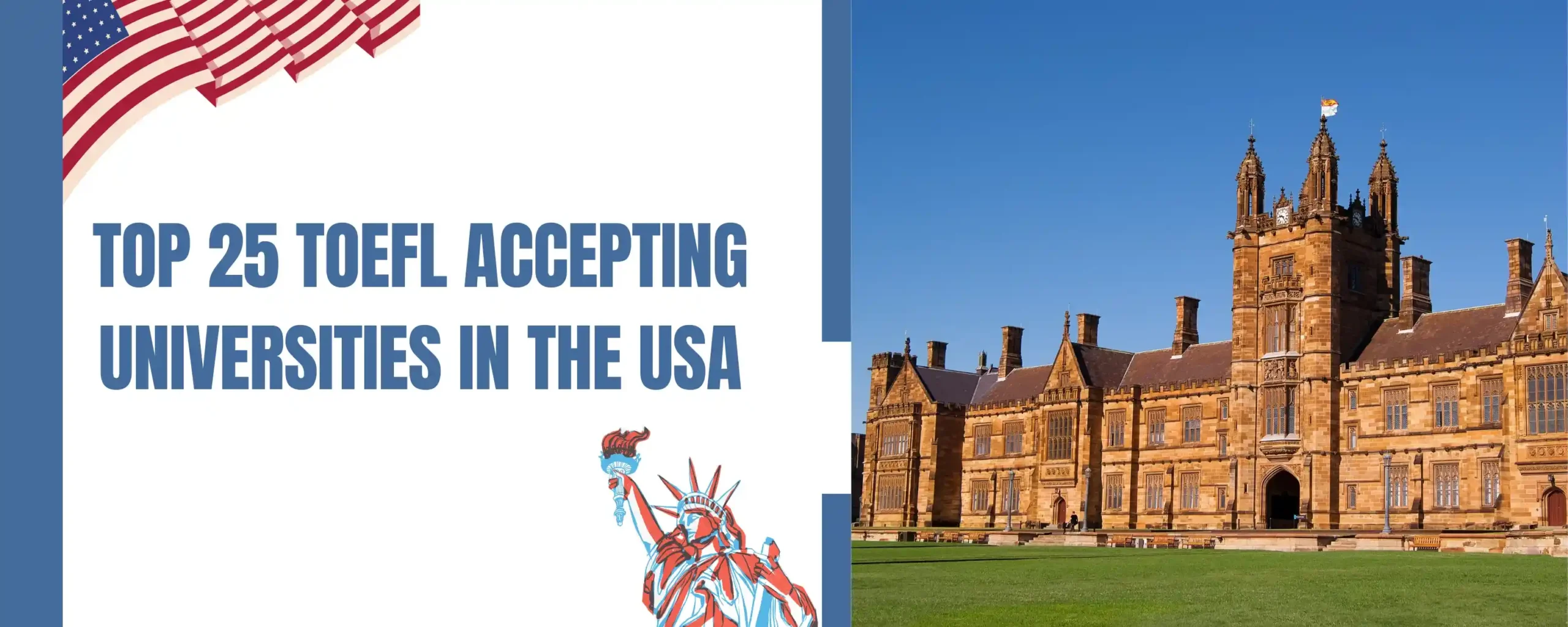Are you an ambitious international student seeking a world-class education in the United States? With over 4,700 higher education institutions to choose from, the USA offers a wide range of opportunities for students from around the world. With increasing competition for U.S. university admissions, proving English proficiency has become a critical step for non-native speakers. The Test of English as a Foreign Language (TOEFL) is widely accepted across American universities and serves as a trusted measure of a student’s ability to succeed in an English-speaking academic setting.
This blog highlights the top 25 universities in the USA accepting TOEFL scores for the 2026-2027 academic intake. Whether you aim for a top-ranked institution or seek programs tailored to your career goals, this guide will provide essential information to help you plan your academic journey.
Overview of TOEFL Requirements
TOEFL is one of the most accepted English proficiency tests for U.S. university admissions. Most institutions require the TOEFL iBT (Internet-Based Test), though some may accept the TOEFL Essentials test.
Minimum TOEFL iBT Score Requirements
The average required score ranges from 80 to 100 for undergraduate programs and 90 to 110 for graduate studies. It’s essential to verify score requirements on each university’s admissions portal for accuracy.
- Top-Ranking Universities: A score of 100+ is typically required, with section scores of at least 25 each.
- Moderate Scores (80-100): Universities in this range still offer excellent programs but may restrict access to advanced or competitive courses.
- Lower Scores (60-80): Mid- and lower-ranking universities, offer conditional admissions for students with slightly lower TOEFL scores, coupled with English bridge programs.
Program-Specific Requirements
Certain programs require higher TOEFL scores due to their academic demands:
- Medicine, Psychology, MBA, Law, Literature: These fields often require a high level of human interaction and the ability to process complex information, necessitating higher scores.
- STEM Courses (Science, Technology, Engineering, Math): While demanding, they may prioritize analytical skills over spoken fluency, leading to slightly lower section requirements.
Criteria for Selecting the Top Universities
Selecting the top 25 TOEFL-accepting universities in the U.S. is based on several essential factors that ensure international students receive a well-rounded education and support. Here are the key criteria used:
1. Academic Reputation: Universities with a strong global and national reputation were prioritised. These institutions consistently rank high for their academic quality, research output, and faculty expertise. Recognized rankings such as QS World University Rankings and U.S. News & World Report were considered.
2. Variety of Programs: The diversity and quality of academic programs offered played a crucial role. Universities that provide a wide range of undergraduate, graduate, and professional courses, including fields like STEM, business, medicine, and humanities, were highlighted.
3. TOEFL Score Requirements: Institutions with clear and reasonable TOEFL score requirements for international students were prioritised. Universities offering flexibility in admissions, such as conditional acceptances or English bridge programs, also gained consideration.
4. Campus Facilities: Modern and well-equipped campuses with facilities like state-of-the-art libraries, research labs, and student housing enhance the learning experience. Universities with exceptional facilities that support academic and personal development stood out.
5. Support for International Students: Universities that provide robust support services, such as:
- Dedicated international student offices
- Language assistance programs
- Cultural integration activities
- Career services for global job placement
6. Scholarships and Financial Aid: Institutions offering scholarships, grants, or work-study opportunities specifically for international students were given preference. These options make education more affordable and accessible.
7. Campus Diversity and Inclusion: Diverse student bodies and inclusive campuses that celebrate multiculturalism were key considerations. Universities with students from various nationalities create a welcoming environment for global learners.
8. Geographic Location: The location of the university plays a critical role. Institutions situated in cities with:
- Job opportunities
- Internships
- A vibrant student life
were preferred. Locations with relatively affordable living costs were also considered for international students on a budget.
By evaluating these factors, the curated list of top universities ensures that students have access to high-quality education, world-class facilities, and comprehensive support for their academic journey in the United States.
List of Top 25 TOEFL Accepting Universities
Below is a curated list of 25 top U.S. universities accepting TOEFL scores, along with their requirements and highlights:
| University Name | Location | QS World Ranking | TOEFL Score Requirements | Popular Programs | Additional Highlights |
| Harvard University | Cambridge, MA | #4 | 100 iBT (25+ in each section) | Business, Law, Medicine, Engineering | Generous financial aid, extensive research facilities, career placement services, global alumni network. |
| Stanford University | Stanford, CA | #3 | 100 iBT (no specific section req.) | Computer Science, MBA, Medicine | Support for startups, Cutting-edge tech and innovation-focused programs, diverse international student body. |
| Massachusetts Institute of Technology (MIT) | Cambridge, MA | #1 | 90-100 iBT | Engineering, Physics, Computer Science | Access to cutting-edge labs, student innovation funding, focus on interdisciplinary research. |
| University of California, Berkeley (UC Berkeley) | Berkeley, CA | #10 | 90 iBT (22+ in Writing & Speaking) | Environmental Science, Economics, Engineering | Strong research output, active student organizations, affordable tuition. |
| University of Chicago | Chicago, IL | #11 | 104 iBT (27+ Writing) | Economics, Political Science, Sociology | Focus on critical thinking, urban campus with internships, strong international network. |
| California Institute of Technology (Caltech) | Pasadena, CA | #6 | 90 iBT | Astrophysics, Engineering, Chemistry | Small class sizes, NASA collaboration, exceptional research grants. |
| Columbia University | New York, NY | #22 | 100 iBT | Journalism, Business, Law, Public Policy | Located in NYC, robust alumni network, international student support. |
| Yale University | New Haven, CT | #9 | 100 iBT | Law, Fine Arts, Political Science, Biology | Historic campus, arts-focused opportunities, global research collaborations. |
| University of California, Los Angeles (UCLA) | Los Angeles, CA | #29 | 87 iBT (20+ in each section) | Film, Engineering, Business, Psychology | Vibrant campus, entertainment industry hub, active career services. |
| University of Pennsylvania (UPenn) | Philadelphia, PA | #12 | 100 iBT | Business, Medicine, Law, Social Sciences | Home to the Wharton School, numerous global partnerships, exceptional research funding. |
| Princeton University | Princeton, NJ | #16 | 108 iBT (27+ in Writing) | Humanities, Physics, Economics, Philosophy | Fully-funded PhD programs, beautiful campus, emphasis on teaching and mentorship. |
| New York University (NYU) | New York, NY | #39 | 100 iBT (24+ Speaking) | Film, Finance, Media Studies, Technology | Global campuses, strong arts and culture ties, excellent alumni network. |
| University of Michigan | Ann Arbor, MI | #23 | 88 iBT (23+ Writing) | Medicine, Engineering, Education, Business | Large research budget, vibrant campus life, affordable public tuition. |
| Duke University | Durham, NC | #27 | 100 iBT | Medicine, Business, Environmental Science | Focus on interdisciplinary studies, strong mentorship culture, excellent post-graduation opportunities. |
| University of California, San Diego (UCSD) | San Diego, CA | #33 | 83 iBT | Biology, Engineering, Data Science | Access to biotech research, high quality of life, vibrant campus culture. |
| University of Texas at Austin (UT Austin) | Austin, TX | #60 | 79 iBT | Engineering, Business, Media Studies | Affordable tuition, strong tech industry ties, lively student community. |
| Cornell University | Ithaca, NY | #20 | 100 iBT (25+ Speaking) | Agriculture, Hospitality, Architecture, Biology | Sustainability focus, scenic campus, extensive alumni network. |
| University of Southern California (USC) | Los Angeles, CA | #29 | 100 iBT | Film, Engineering, Business, International Relations | Entertainment hub location, exceptional industry connections, strong alumni network. |
| Northwestern University | Evanston, IL | #32 | 100 iBT | Journalism, Business, Medicine, Social Sciences | Career-focused programs, proximity to Chicago, global learning initiatives. |
| University of Washington (UW) | Seattle, WA | #85 | 92 iBT (26+ Writing) | Computer Science, Medicine, Data Science | Proximity to tech giants, extensive internship opportunities, strong research funding. |
| Carnegie Mellon University (CMU) | Pittsburgh, PA | #52 | 100 iBT | Robotics, Computer Science, Business | Pioneer in AI research, strong entrepreneurial culture, global network. |
| University of Illinois Urbana-Champaign (UIUC) | Urbana, IL | #85 | 80 iBT | Engineering, Business, Computer Science | Strong campus life, large international community, industry partnerships. |
| Johns Hopkins University | Baltimore, MD | #24 | 100 iBT (27+ Writing) | Medicine, Public Health, Biotechnology | Top medical institutions, global health focus, prestigious faculty. |
| Boston University (BU) | Boston, MA | #93 | 84 iBT (21+ Writing) | Business, Medicine, Communications, Law | Located in an academic hub, vibrant student life, strong career services. |
This table highlights the top universities’ TOEFL requirements and additional features, making it easier for students to make informed decisions.
Benefits of Studying in the USA
Studying in the United States opens the door to unparalleled opportunities for personal, academic, and professional growth. Here are some of the key benefits of pursuing higher education in the U.S.:
1. High-Quality Education: The U.S. is home to some of the world’s most prestigious universities, known for their rigorous academic programs, cutting-edge research, and experienced faculty. With state-of-the-art facilities and a focus on innovation, students gain access to a world-class education that prepares them for global career opportunities.
2. Cultural Diversity: The U.S. is a melting pot of cultures, offering students the chance to interact with peers from diverse backgrounds. This cultural exchange fosters global awareness, tolerance, and the ability to thrive in multicultural environments. International students can enjoy vibrant campus life with events, clubs, and activities that celebrate different traditions.
3. Access to Research Opportunities: American universities place a strong emphasis on research and development, offering students hands-on experience in various fields. From collaborating with top researchers to working on groundbreaking projects, students can make significant contributions to their chosen disciplines while enhancing their academic credentials.
4. Global Recognition: A degree from a U.S. institution is highly respected worldwide and often serves as a gateway to top-tier job opportunities. Employers value the problem-solving skills, critical thinking, and practical experience that U.S. graduates bring to the table.
5. Extensive Career Resources: Universities in the U.S. offer robust career services, including internship programs, networking events, and career counseling. Students gain access to internships and co-op programs that provide real-world experience and connections with industry leaders.
6. Scholarships and Financial Aid: Many U.S. universities offer scholarships, grants, and assistantships to international students, making education more affordable. These financial aid options help ease the burden of tuition costs, enabling students to focus on their studies.
7. Value of TOEFL: The TOEFL test is globally recognized as a trusted measure of English proficiency. By excelling in TOEFL, students demonstrate their ability to succeed in an English-speaking academic environment. Most U.S. universities accept TOEFL scores, making it an essential step for international students aspiring to study in America.
In summary, the USA remains an attractive destination for international students due to its high-quality education, diverse culture, and unmatched career opportunities. By preparing for and excelling in the TOEFL exam, students can unlock the doors to their dream universities and set the stage for a bright future.
Tips for International Students
Preparing for the TOEFL and applying to U.S. universities can be an overwhelming process, but with the right approach and resources, you can excel. Here are some practical tips to help you navigate this journey successfully:
1. Start Early: Begin your TOEFL preparation and university application process well in advance. This gives you ample time to research universities, understand their requirements, and prepare your application documents.
2. Understand the TOEFL Format: Familiarize yourself with the structure of the TOEFL iBT, including the Reading, Writing, Listening, and Speaking sections. Knowing what to expect will boost your confidence and help you focus on improving specific skills.
3. Practice Regularly: Consistency is key when preparing for the TOEFL. Dedicate time each day to practice English in daily conversations. Use official TOEFL practice tests to simulate exam conditions.
4. Improve Time Management: During the TOEFL exam, time is limited for each section. Practice answering questions within the given timeframe to avoid running out of time on test day.
5. Join TOEFL Course: For comprehensive preparation, consider enrolling in a TOEFL Course. Their experienced instructors provide personalized guidance, effective strategies for TOEFL exam, and access to high-quality practice materials to help you achieve your desired score.
6. Research University Requirements: Different universities and programs have varying TOEFL score requirements. Visit the official websites of the universities you’re interested in to check their minimum scores and specific requirements for your course of study.
7. Craft a Strong Application: In addition to your TOEFL score, ensure your application is well-rounded. Write a compelling statement of purpose, obtain strong recommendation letters, and highlight any extracurricular achievements.
8. Stay Motivated: Preparing for the TOEFL and applying to universities can be stressful, but stay focused on your goals. Break your preparation into manageable tasks and celebrate small milestones to maintain motivation.
By following these tips and leveraging the right resources, you can excel in the TOEFL exam and secure admission to a top U.S. university. Start your preparation journey today with La Forêt Education to achieve your academic dreams.
Conclusion
Studying in the U.S. is a dream for many international students, thanks to its world-class education system, diverse cultural experiences, and global career opportunities. However, achieving this dream requires careful preparation, starting with acing the TOEFL and selecting the right university that aligns with your academic and career goals. With the insights provided in this blog, you’re now equipped with valuable information about TOEFL requirements, top universities, and strategies to excel in your preparation. All the best!
Frequently Asked Questions
Q: What is the TOEFL score cut-off for US universities 2024-25?
Ans: The TOEFL score cut-off for U.S. universities in the 2024-25 academic year typically varies based on the institution and program. For most universities, the minimum score ranges between 80 and 100 on the TOEFL iBT. However, top-ranking institutions such as Harvard or MIT may require scores of 100 or higher, with section-specific requirements. It’s always recommended to check the specific cut-off for your program on the university’s official website.
Q: What is the minimum TOEFL score for a USA university?
Ans: The minimum TOEFL score for U.S. universities generally depends on the institution and the program. Most undergraduate programs require a score of 80 or above, while graduate programs may set the minimum at 90 to 100. Some universities offer conditional admission for scores slightly below the requirement, provided the student completes an English bridge program. Lower-ranking universities or community colleges might accept scores as low as 60 to 70, offering more flexibility for international students.
Q: Is TOEFL hard for Indian students?
Ans: TOEFL is not inherently hard for Indian students, but its difficulty level depends on individual English proficiency and preparation. Since TOEFL focuses on academic English, students who are comfortable with English in reading, writing, speaking, and listening contexts may find it manageable. However, challenges may arise for those unfamiliar with an American accent or academic vocabulary. Regular practice, mock tests, and structured courses can significantly improve performance and confidence.
Q: Do colleges in the USA prefer IELTS or TOEFL?
Ans: Both IELTS and TOEFL are widely accepted by U.S. colleges, but the TOEFL is generally preferred due to its alignment with American academic standards. Many universities explicitly list TOEFL as their primary English proficiency requirement. However, IELTS is equally valid at most institutions. The choice often depends on the student’s comfort level and test availability. For example, students more familiar with British English might opt for IELTS, while those comfortable with American English may find TOEFL a better fit. Always verify the test preferences of your chosen universities before registering.





